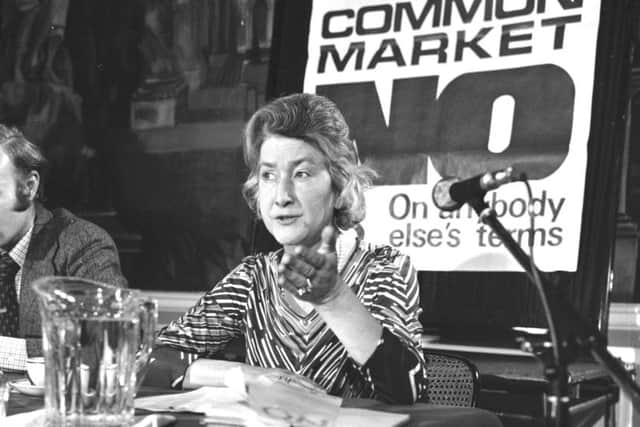I love EU: How Scotland learned to love the European Union
Few politicians around 47 years ago, when the UK joined what was then known as the European Community (EC), could have predicted that Europe - and Scotland’s place within it - would one day become a key issue in a continuing debate over the country’s constitutional future.
The UK officially joined the EC - often referred to as the Common Market - on January 1, 1973.
Advertisement
Hide AdAdvertisement
Hide AdScotland, like the rest of Britain, was already in the grip of industrial decline - a process that would intensify as the decade progressed - and arguments in favour of European membership often came down to economics.


The loudest voices against came from Labour and SNP members. Many Tories - but not at all - were pro-Europe.
Among them was Gordon Campbell, Secretary of State for Scotland in Ted Heath’s administration. He was adamant that Scots stood to benefit.
He declared that 1973 was “the beginning of a great enterprise - the restoration and strengthening of Scotland ties with Europe”.
But Euroscepticism lingered. Harold Wilson promised a referendum on the UK’s membership and duly delivered one in 1975 when Labour was returned to power.
“All the parties were divided on the issue of Europe in the 1970s,” said James Mitchell, professor of public policy at the University of Edinburgh.
“They all had to manage the issue and it wasn’t easy. But in Scotland, it is fair to say that the left were more critical.
“Something significant happened over a period time when those who campaigned for a No in 1975 switched to a Yes.”
Advertisement
Hide AdAdvertisement
Hide AdOne survey of Scottish voting intentions found that 71 per cent of Conservative supporters backed the UK’s continuing membership of the EC. In contrast, 58 per cent of SNP supporters were in favour of the UK coming out.
Donald Stewart, leader of the Nationalist group of MPs in Westminster, told the party’s conference in Perth that the SNP should be implacably opposed “for all time” to the Common Market.
He said the EC represented everything the SNP was against - “centralisation, undemocratic procedures, power politics, and a fetish to abolish all cultural differences”.
Opposition to EC membership cut across party lines. Willie Ross, Scottish Secretary under Wilson, said: “From the point of view of the people of Scotland I have not the slightest doubt that they would be better off out of it.”
Such scepticism was not enough to prevent a comprehensive victory for the Yes campaign. At a UK level, 67 per cent backed membership of the EC, with 33 per cent against. Enthusiasm was more muted in Scotland - with 62 per cent voting in favour of membership.
“During the course of the 1980s you start to see a gradual shift in attitudes,” added Prof Mitchell.
“You see the Conservatives under Mrs Thatcher become far more critical, while Labour, the SNP, and the trade unions started to become much more supportive.
“1988 was when the SNP launched their ‘Scotland in Europe’ policy but they had been moving in that direction for quite some time.”
Advertisement
Hide AdAdvertisement
Hide AdThe early 1980s were a period of internal strife for the SNP but those that emerged to lead the party into the 1990s found there was one thing they could agree on.
“Europe as an issue carried across other divisions in the party,” the academic added. “It played a significant part in healing the wounds.
“There were members who found themselves on the opposite sides of very fierce internal battles from around 1979-1983, but who agreed on Europe.
“A crucial part in all of this is the European Union was changing fundamentally. The community, for the first time, started to take regional development seriously.
“The European Regional Development Fund emerges from 1975. It was designed to help areas that endured industrial decline and Scotland was a huge beneficiary.
“Among the major beneficiaries were local authorities. So by the late 1980s the attitude was changing because Europe was changing.”